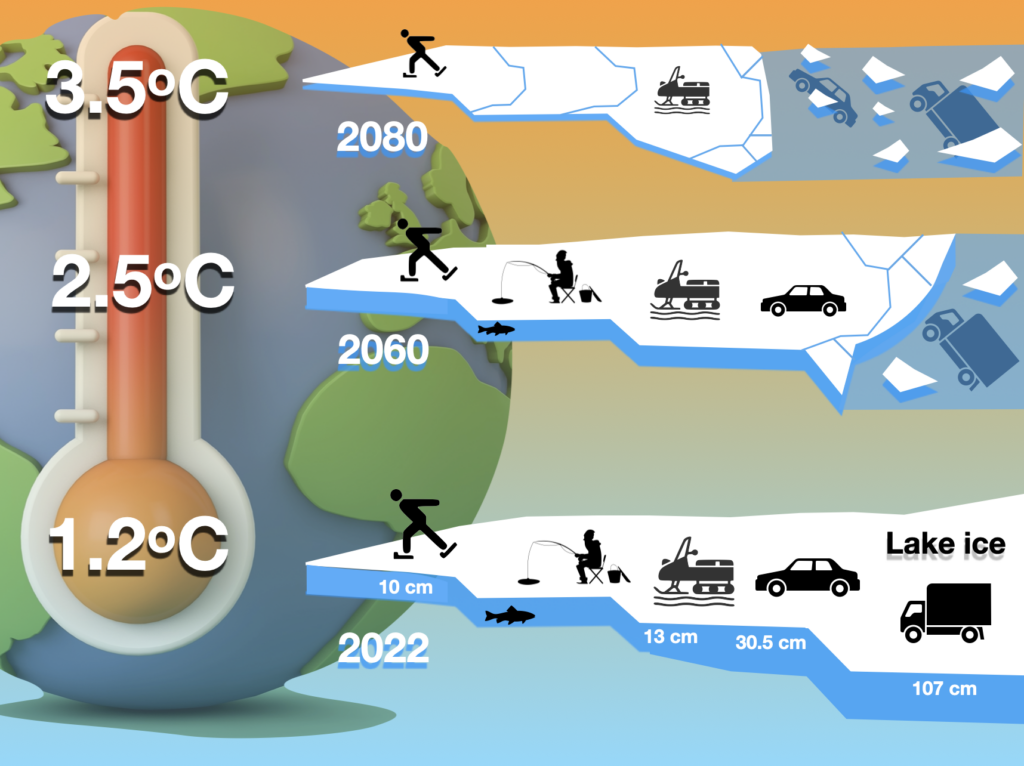Millions of international viewers enjoyed watching the reality TV show “Ice Road Truckers”, in which experienced truck drivers were expected to master scary challenges, such as transporting heavy supplies across frozen lakes in the remote Arctic. According to a new study published in the prestigious journal Earth’s Future by an international team of climate and lake scientists, crossing frozen lakes with heavy trucks may soon be a matter of the past.
The study is based on one of the most comprehensive future climate change model simulations to date (the Community Earth System Model ver. 2 Large Ensemble) to determine at which warming levels unsafe ice conditions will be reached regionally with regards to transportation and recreational activities, including ice-fishing or ice-skating.
The conclusion of the study is straightforward, namely that global warming will make lake ice much less safe (Figure). This is likely to affect indigenous communities in the Arctic as well as regional economies, where people rely on ice roads as a means for fast and comparatively cheap transportation and supply during winter. Thinning future ice-conditions also threatens unique lake ecosystems that have adapted to recurring frozen lake conditions over tens of thousands of years.

“Our results demonstrate that the duration of safe ice over the next 80 years will shorten by 2-3 weeks depending on the future warming level. In regions where lakes are used as ice roads to transport heavy goods and supplies, the number of days with safe ice conditions will decline by more than 90%, even for a moderate warming of 1.5°C above early 20th Century conditions”, says Dr. Lei Huang, corresponding author of the study and former postdoctoral researcher at the IBS Center for Climate Physics (ICCP), in Busan, South Korea.
“According to our computer model simulations, many densely populated regions in the mid-latitudes are projected to experience a large deterioration in safe ice conditions for recreational activities. Already a 1.5°C warming above early 20th Century conditions can lead to more than 60% loss in the duration of safe lake ice. This will negatively impact local communities that rely on the ice recreation industry.” says Dr. Iestyn Woolway from Bangor University, UK, first author of the study.
Dr. Sapna Sharma from York University in Canada, one of the lead authors, added, “Given that our planet has already warmed by 1.2°C since the beginning of industrialization, it is timely to implement proper regional adaptation strategies in affected communities to mitigate economic losses and to avoid loss of lives.”
– References
Lake ice will be less safe for recreation and transportation under future warming (2022): R. Iestyn Woolway, Lei Huang, Sapna Sharma, Sun-Seon Lee, Keith B. Rodgers, Axel Timmermann, Earth’s Future, vol.10, 10, e2022EF002907, doi: 10.1029/2022EF002907
– Media Contact
For further information or to request media assistance, please contact: U-Jeong Seo, IBS Center for Climate Physics, Pusan National University (+82-51-510-7328, u_jeongs@pusan.ac.kr)
– About the Institute for Basic Science (IBS)
IBS was founded in 2011 by the government of the Republic of Korea with the sole purpose of driving forward the development of basic science in South Korea. IBS has 34 research centers as of April 2022.
– About ICCP
The IBS Center for Climate Physics (ICCP) seeks to expand the frontiers of Earth system science by conducting cutting-edge research into climate dynamics and utilizing high-performance computer simulations, with the goal of improving decadal Earth system forecasts and long-term projections. See more on http://ibsclimate.org. The CESM2 Large Ensemble simulation was conducted on the Cray XC50 supercomputer Aleph at the headquarter of the Institute of Basic Science in South Korea.